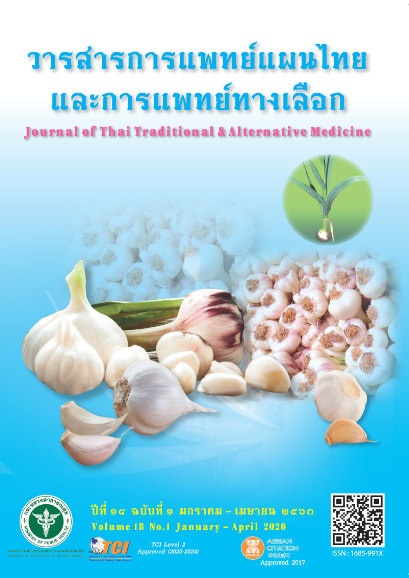Prescribing Patterns for Dyspepsia at Outpatient Department of Public Hospitals in Surat Thani
Main Article Content
Abstract
This cross-sectional retrospective study aimed to assess the prescribing patterns for outpatients with dyspepsia at hospitals in Surat Thani from 2014-2016. Prescription data of 15 hospitals in Surat Thani province was extracted from the electronic database using the ICD-10 code K30. Descriptive statistics were used for data analysis. The total number of outpatients that had dyspepsia was 63,249. Most patients were female 39,453 (62.38%) and the average age was 45.42 years. The proportion of dyspepsia in outpatients was slightly increased (1.87%, 1.96%, 2.02%, respectively). The prescription for dyspepsia showed that the number of modern medicines was 345,489 (95.48%), meanwhile only 4.52% was herbal medicine. The top three modern medicines were omeprazole (21.79%), antacid (18.51%), and simethicone (12.62%), whereas Curcumin capsules were the most prescribed herbal medicine (3.54%). Basically, during 3 years the prescription for dyspepsia showed 3 patterns, 1) only modern medicine, 2) a combination of modern and herbal medicines, 3) only herbal medicines. In 2016 the proportion of dyspepsia prescribing patterns were 85.77%, 13.51%, 0.72%, respectively. Prescribing patterns showed that modern medicines were most commonly used for dyspepsia, while using herbal medicines or a combination of both was very low. Factors affecting prescribing patterns, such as rational use and effectiveness, should be studied further.
Article Details
References
Sukhato K. How to approach dyspepsia in primary care. Bangkok: Department of Famity Medicine. Faculty of Medicine. Ramathibodi hospital; 2014. (in Thai)
Talley NJ. Vakil NB. Moayyedi P. American gastroenterological association technical review on the evaluation of dyspepsia. Gastroenterology. 2005;129(5):1756-80.
The Gastroenterological Association of Thailand. Guideline for the management of Dyspepsia & Helicobacter pylori 2010: Bangkok Wetchasam Printing House; 2010. (in Thai)
Maneerattanaporn M. Dyspepsia and functional dyspepsia. in Poonchai Charatcharoenwitthaya P, editors. Update in internal medicine 2014. Bangkok: Department of Medicine. Faculty of Medicine. Siriraj Hospital; 2014. p. 527-36.
Thavorn K. Mamdani MM. Straus SE. Efficacy of Turmeric in the treatment of digestive disorders: a systematic review and meta-analysis protocal. Systematic Reviews. 2014;3(71).
Chakraborty PS, Ali SA, Kaushik S, Ray RK, Yadav RP, Rai MK, Singh D, Bhakat AK, Singh VK, John MD, Das KC, Prasad VG, Nain SS, Singh M, Chandra PK, Singh
DK, Rai Y, Singh P, Singh O, Singh AKN, Shag M, Pradhan PK, Bavaskar R, Debata L, Nayak C, Singh V, Singh K, Curcuma longa - a multicentric clinical verification
study. Indian Journal of Research in Homeopathy. 2011;5(1):19-27.
Gupta SC, Patchva S, Aggarwal BB. Therapeutic roles of Curcumin: lessons learned from clinical trials. The AAPS Journal. 2013;15(1):195-218.
Sirijarugul S. Efficary and side effects of Curcuma Longa and ranitidine in patients with uninvestigated dyspepsia. (thesis). Bangkok : Graduate School Silpakorn
University; 2007.
Puttapitakpong C. Effectiveness of Curcuma Longa Linn. compare with Omeprazole on treatment of functional dyspepsia. Gastroenterology. 2016;150:(4:S43).
National drug system committee. Essential Drug List 1999.
Department of Thai Traditional and Alternative Medicine. Ministry of Public Health. HDC TTM Service [Internet]. [cited 2020 February 4]. Available from: https://
hs.dtam.moph.go.th/
Ministry of Public Health Public and Private sector. National Mater Plan of Thai Herbal Development 2017-2021. 1st edition. Department of Thai Traditional and
Alternative Medicine; 2016.
VIpin kumar singh. Prescribing pattern of acid suppressenats in modern practice - an analysis. Der Pharmacis Sinica. 2011;2(3).
Thammalikhitkul W. Efficacy of Turmetic for flatulence. Journal of the Medical Association of Thailand. 1989;(72):614-9.
Pongcharoensuk P, Sampradit S, Hongsamuth D, Saranurak P. Study of drug utilization for outpatients under different health Insurances at a community hospital in 2006. Thai Journal of Hospital Pharmacy 2010;20(2):134-41.
Di Mario F, Cavallaro LG, Nouvenne A, Stefani N, Cavestro GM, Iori V, Maino M, Comparato G, Fanigliulo L, Morana E, Pilotto A, Martelli L, Martelli M, Leandro G,
Franzè A. A curcumin-based 1-week triple therapy for eradication of Helicobacter pylori infection: something to learn from failure? Helicobacter. 2007;12(3):238-
Vejakama P, Thongron P, Larvongkerd C, Juntharaj T, Muanchart S, Singkum N, Boonsong A. Combination of Curcuma Longa and Omeprazole in the treatment of peptic-ulcer disease and H. pylori eradication in comparison to the triple therapy: A controlled clinical trial. Srinagarind Medical Journal. 2008;23(1):100-6.


